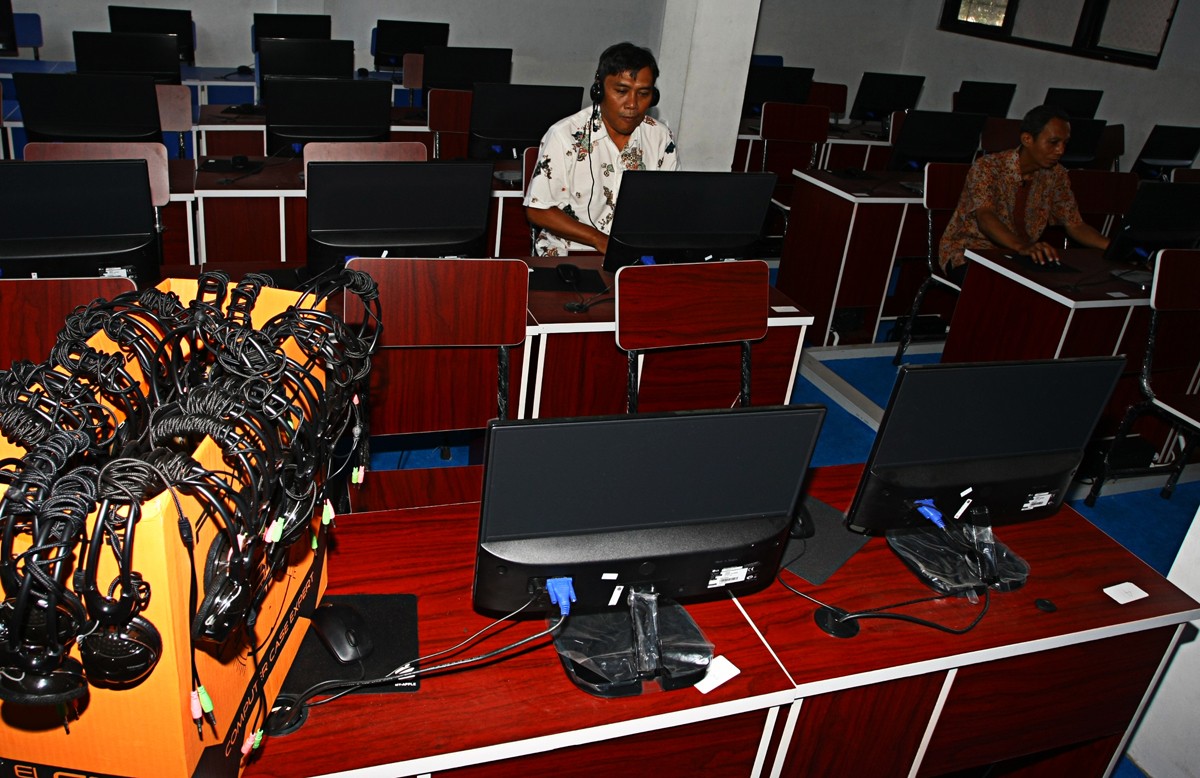Popular Reads
Top Results
Can't find what you're looking for?
View all search resultsPopular Reads
Top Results
Can't find what you're looking for?
View all search resultsBlackouts, slow network mar computer-based exams
School administrators in Jakarta have every reason to worry that the implementation of the computer-based national examinations could face difficulties given spotty internet connections and the trouble-prone electricity grid.
Change text size
Gift Premium Articles
to Anyone
School administrators in Jakarta have every reason to worry that the implementation of the computer-based national examinations could face difficulties given spotty internet connections and the trouble-prone electricity grid.
In Menteng, Central Jakarta, administrators of state vocational school SMK 10 called an internet service provider and state electricity company PLN to send technicians to ensure that there would be no disruption in the internet connection or electricity supply.
SMK 10 was not alone. Many schools had earlier written to internet provider PT Telkom and to PLN to get guarantees that the two basic services would operate without disruption over the next four days when thousands of vocational school students take the exam.
Despite the precautions, problems have persisted. In North Jakarta, a brief power outage after the exam started at 7:30 a.m. forced 17 students from SMK Benteng Gading to take part of their test in nearby SMK 9, before returning to their classroom.
All of Jakarta’s 2,940 schools, are taking part the computerbased exams this year, a significant increase compared to last year, when only 47 percent of schools were involved.
More than 7.7 millions students from 98,000 junior and senior high schools across the country are expected to take their national exams in the coming weeks, with 48.93 percent sitting computer-based exams.
Students at vocational schools will take the test this week, while senior and junior high schools exams are scheduled to take it in the following weeks.
The country has 1,327,246 vocational school students in 9.829 schools and 88.6 percent of them are taking the computer-based exam.
This year, only six provinces are running the computer-based exam, Bangka Belitung, Jakarta, East Java, South Kalimantan and South Sulawesi and Yogyakarta.
The Culture and Education Ministry has said that the primary problem that prevents schools from conducting computer-based exams is a shortage of internetconnected computers.
The ministry’s coordinator for computer-based national exams, Ari Santoso, said at least 48,000 schools in the country lacked enough computers for all their students.
The ministry, however, was not responsible for providing computers or internet connections, Ari said.
“Honestly this is not the Culture and Education Ministry’s problem,” Ari said, adding that individual schools should provide their own electricity and internet connections, and that the ministry could not provide for them.
Separately, the ministry’s head of education assessment, Nizam, said steps had been taken to make sure that the IT networks used in the national exam would not be compromised by hackers.
Last week, Culture and Education Minister Muhadjir Effendy warned hackers to stay away from the ministry’s computer network during the implementation of the national exams.
“In fact, we asked all IT and hackers communities to secure the process of the national exams as part of their contribution to the [education] of Indonesia’s students,” Nizam said.
He said the ministry had collaborated with the National Encryption body to secure the national exams.
Meanwhile, school administrators in the regions continue to struggle with basic infrastructure.
“With our school’s 1 Mbps internet connection we have to download and send data from four of our local servers to the central server, it could take hours or maybe a couple of days for us to finish the sync process,” Ignasius Endar, a teacher from SMK 1 Nabire, Papua, said on Monday. (dis/hol)
------
Rizal Harahap, Ruslan Sangadji, Djemi Amnifu, Markus Makur, Nethy Dharma Somba, Suherdjoko, and Agnes Anya contributed to this story.










